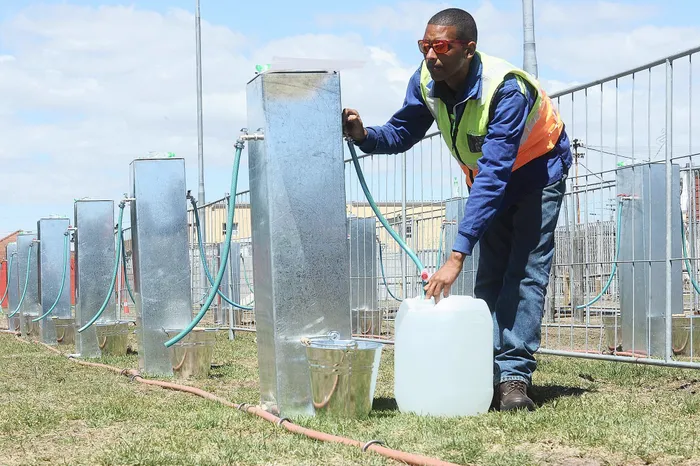#WaterCrisis: Firms cashing in on drought solutions

GETTING READY: Brandon Herringer testing one of the taps that will assist Maitland residents when Day Zero arrives and the taps are turned off. Picture: Cindy Waxa/African News Agency/ANA GETTING READY: Brandon Herringer testing one of the taps that will assist Maitland residents when Day Zero arrives and the taps are turned off. Picture: Cindy Waxa/African News Agency/ANA
Cape Town - Local firms are trying their best to save water while maintaining their operations. However, the water crisis has boosted the business of some firms.
Ray de Vries, the chief executive of Airwater, said Theewaterskloof Dam, one of the major dams supplying Cape Town’s water, was 15.4% full.
“We are dropping 1.1% a week. We are going to be sitting with no water in Theewaterskloof.”
De Vries added that business had been “unbelievable” selling in excess of 300 small machines a month to households, while there have been seven orders for the larger bottling plants, for bottling. He added that he had been in the business of water supply for 11 years.
“We take it very seriously. We’ve doubled, in fact we’ve tripled our premises' staff. We’ve got 14 new staff.”
Tony Marchesini, the managing director and franchisor for H2O International SA, said that in times of water shedding, water and soil on the outside of water pipes entered the pipe through holes and cracks due to the lack of water pressure within the pipe to prevent it.
“Added to this, water around the pipes is often polluted from the surface water, so when the water is switched back on, the contaminants are transported to the user’s taps.”
Marchesini added that the chlorine added to drinking water in order to clean it often failed to disinfect the pipes sufficiently, and studies showed it could lead to serious illness.
“The only way to be completely sure your tap water is pure is to purify it through a purifier which removes all the unwanted contaminates from your municipally treated water, not only the toxic bacteria, but also the heavy metals, pharmaceuticals and chemicals the municipalities are forced to pump into the system.”
Marchesini said they were “extremely busy" in the Western Cape where sales had picked up by about 20% to 25% because of the heat and low dam levels, while H20 franchisees were also hiring more people to cope with delivery and installations.
He added that people were concerned about the water situation and that many people were installing water tanks on their properties to capture rainwater for domestic use.